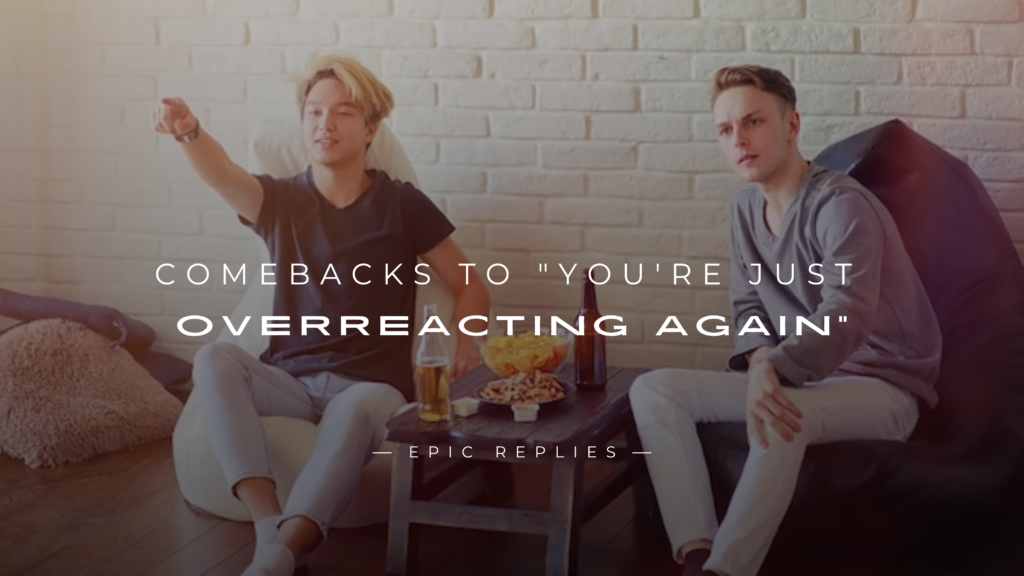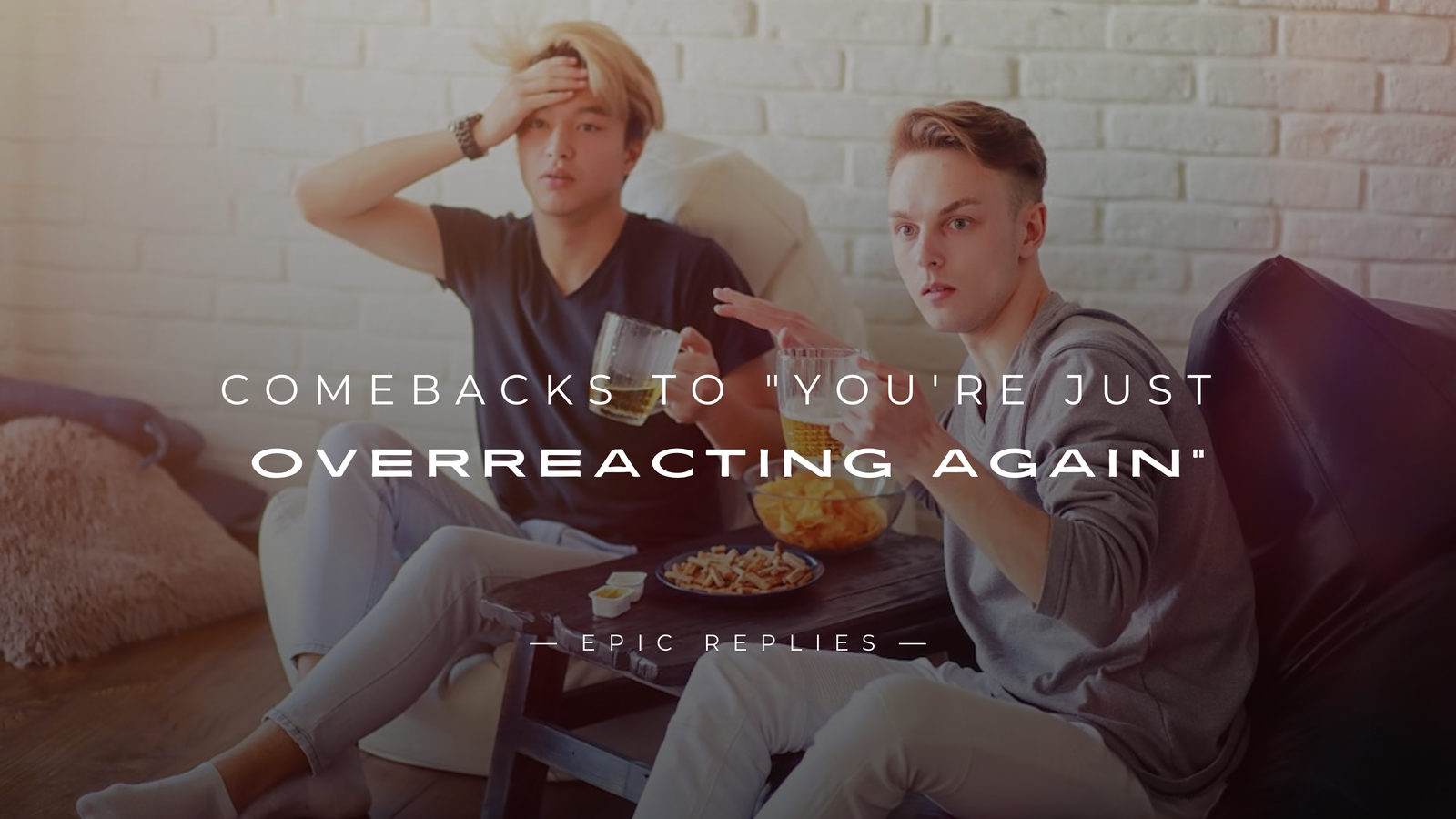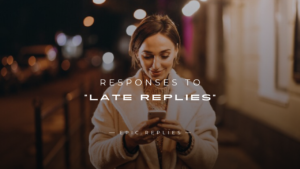Imagine this: you’re sharing something that’s really bothering you—maybe a problem at work, a disagreement with a friend, or a personal frustration. Instead of getting understanding, someone cuts in and says, “You’re just overreacting again.” It hits like a punch. Suddenly, your emotions feel dismissed, trivialized, and your entire reaction labeled as excessive or unreasonable. If you’ve been there, you know how confusing and hurtful this phrase can be. You start questioning yourself: Am I really making too much out of this? Or worse, Am I just too sensitive? But here’s the truth—your feelings matter, and you have the right to express them without being belittled. So how do you respond when faced with this dismissive phrase? How do you stand your ground without turning the conversation into a fight? This article will guide you through understanding why people say “You’re just overreacting again,” the emotional impact behind it, and practical, detailed ways to craft comebacks that protect your feelings, build respect, and improve communication. Ready to reclaim your voice? Let’s get started.

220+ Comebacks to “You’re Just Overreacting Again”
Sarcastic Comebacks
- Oh, sorry—did my valid reaction interrupt your emotional detachment?
- You’re right, I should bottle it up like a well-adjusted volcano.
- Yep, just me and my award-winning overreactions—thank you for noticing.
- Guess what? This episode’s brought to you by “Feelings”—the horror!
- If I had a dollar for every time you called it overreacting, I could afford therapy for both of us.
- Please, do go on about how I shouldn’t feel things. I’m riveted.
- I forgot you’re the emotion police—should I fill out a permission slip next time?
- Great, now gaslighting comes in bulk?
- Ah, the classic “overreacting” card. You really are predictable.
- I must be overreacting—after all, you’re never wrong, right?
Calm & Rational Comebacks
- I’m not overreacting—I’m reacting appropriately to something that bothers me.
- Dismissing how I feel isn’t helpful. Let’s talk about it instead.
- My emotions are valid, even if you don’t understand them.
- Can we approach this with mutual respect instead of blame?
- I’m open to hearing your side, but I also need mine acknowledged.
- I know it seems intense, but this matters to me.
- Let’s try to understand each other instead of labeling emotions.
- It might look like overreacting to you, but there’s more behind what I’m expressing.
- Would you mind asking why I feel this way before assuming it’s an overreaction?
- I’m asking for understanding, not a judgment.
Witty & Clever Comebacks
- Overreacting? Nah—I just have high production value.
- I’m not overreacting, I’m giving the drama this scene deserves.
- I prefer the term “emotionally efficient.”
- Hey, at least I bring passion to the conversation.
- Overreacting is just reacting in high definition.
- I’m not extra—I’m just thorough with my feelings.
- You call it overreacting, I call it character development.
- Guess I’m just the main character again.
- Sorry, didn’t realize calm indifference was the gold standard.
- Trust me, if I were overreacting, you’d really know.
Confident & Assertive Comebacks
- I’m allowed to express myself without being dismissed.
- Labeling my reaction doesn’t make your behavior okay.
- I trust my feelings, and I don’t need to apologize for them.
- I’m standing up for myself, not overreacting.
- My emotions are mine to express—respect that.
- I won’t let “overreacting” be used as a way to silence me.
- I’m confident in how I feel, even if you disagree.
- Speaking up doesn’t mean I’m being dramatic.
- I’ve thought about this, and I know why I feel this way.
- If you’re uncomfortable with my reaction, maybe it’s time to look at your actions.
Humorous & Playful Comebacks
- Overreacting? Hold on—let me get my Oscar.
- Just wait till I add dramatic music and slow-mo.
- I only look like I’m overreacting because I skipped lunch.
- You haven’t even seen my final form yet.
- Plot twist: I was underreacting the whole time!
- If this is overreacting, imagine how I handle surprise parties.
- It’s not drama—it’s emotionally enhanced storytelling.
- Maybe I’m just passionate about everything… including snacks.
- Sorry, I was practicing for my role in a soap opera.
- Who knew my superpower was feelings?
Defensive & Protective Comebacks
- You don’t get to decide how much something affects me.
- I’m allowed to feel upset when something hurts.
- That word—”overreacting”—feels like a way to shut me down.
- If you cared about me, you’d try to understand, not judge.
- I don’t need to justify why this matters to me.
- You’re not in my shoes, so you don’t get to label my response.
- I react this way because I care. That’s not a flaw.
- Dismissing me isn’t a solution—it’s part of the problem.
- I speak up when something matters, and I won’t apologize for that.
- You may not agree, but I have every right to feel this way.
Empathetic & Understanding Comebacks
- I hear that you think I’m overreacting—can we talk about why this feels big to me?
- I know this seems like a lot, but I promise there’s more to it.
- I wish you’d try to understand how this affects me.
- I’m reacting strongly because it really touched a nerve.
- Let’s try to meet each other halfway here.
- I know it’s not your intention, but it still hurt.
- It would mean a lot if you could try to see where I’m coming from.
- Maybe I am feeling a lot—but that doesn’t mean it’s not real.
- I value this relationship, which is why I care so deeply.
- Can we try listening to each other instead of labeling emotions?
Reverse the Accusation Comebacks
- Or maybe you’re underreacting—ever thought of that?
- Funny, I was just about to say the same to you.
- Overreacting? Or just reacting to being constantly dismissed?
- And you’re just minimizing again. See how that works?
- Isn’t it convenient how I’m always the one overreacting?
- Interesting how my emotions are the issue—but never your behavior.
- If I’m overreacting, what do you call brushing off someone’s feelings?
- If expressing emotions is overreacting, what does that make your silence?
- And you’re just deflecting again, as usual.
- Sounds like calling it “overreacting” is your way of avoiding accountability.
Questioning Their Judgment Comebacks
- Says who? You, the official feelings expert?
- What makes you think you get to define what’s too much?
- Based on what? Your flawless emotional track record?
- Have you actually thought about how I might feel—or just decided for me?
- Are you really listening, or just labeling what you don’t want to deal with?
- Why is your version of “reasonable” the only one that counts?
- And what would reacting “just right” look like to you, exactly?
- Maybe instead of judging, try understanding for once?
- Ever consider your view might be a little skewed?
- How often do you stop to ask if you’re being fair?
Mocking Their Ignorance Comebacks
- Ah yes, Dr. Emotion, thanks for the expert diagnosis.
- You clearly majored in gaslighting with a minor in condescension.
- Wow, you read one tweet about “emotional regulation” and now you’re Freud?
- Love how you dismiss feelings like it’s a skill.
- You should teach a course: “How to Be Emotionally Unavailable 101.”
- Remind me again—how exactly did you earn your degree in judging reactions?
- So much confidence for someone who doesn’t even understand what empathy is.
- Do you always treat emotions like a foreign language?
- Your ignorance is showing again—might wanna zip that up.
- You’re not emotionally intelligent, just emotionally lazy.
Philosophical or Deep Comebacks
- Maybe what you call “overreacting” is just me finally refusing to stay silent.
- Emotions are messengers—not mistakes.
- If I don’t feel deeply, how can I ever connect deeply?
- Maybe my reaction is the result of years of not reacting.
- The intensity of my emotion doesn’t invalidate its truth.
- You call it overreacting—I call it being fully alive.
- What we fear in others’ emotions often mirrors what we avoid in ourselves.
- Maybe the issue isn’t how I feel, but how uncomfortable you are with feelings.
- Isn’t labeling emotion just another way of avoiding vulnerability?
- Feeling deeply isn’t a flaw—it’s human.
Short and Sharp Comebacks
- Not your call.
- Says you.
- Try again.
- You’re deflecting.
- That’s lazy.
- Care to actually listen?
- I won’t apologize for feeling.
- You’re missing the point.
- Not everything is about your comfort.
- Respect it—or don’t.
Over-the-top Dramatic Comebacks
- Oh, I’m overreacting? Then behold my full Shakespearean meltdown!
- Should I faint now, or do you want tears first?
- BRB, writing a sonnet about my overreaction.
- Cue the thunder, lightning, and tragic violin!
- How dare you insult the Academy Award-worthy performance I just gave!
- This overreaction was brought to you by caffeine and emotional repression!
- Someone get me a fainting couch and dramatic lighting!
- I’ll overreact when I’m dead! Or until I get a snack. Whichever comes first.
- If I’m overreacting, then I better win an Emmy.
- I was born for this level of drama. Don’t try to dull my sparkle.
Pop Culture or Meme-inspired Comebacks
- I’m not overreacting—I’m just in my “main character” era.
- Calm down? Babe, I am the storm.
- This isn’t an overreaction—it’s a plot twist.
- Keep talking and I’ll start quoting Taylor Swift lyrics at you.
- “Overreacting”? That’s just my villain origin story.
- This energy is giving full “I understood the assignment.”
- I’m not overreacting—I’m channeling my inner Moira Rose.
- Welcome to Season 3 of “She Finally Snapped.”
- I only react in high-definition, 4K drama.
- I’m not overreacting—I’m just following Beyoncé’s lead.
Sarcastic Agreement Comebacks
- Yep, just another day of me being too much, as usual.
- Totally. I wake up each morning planning my emotional explosions.
- Absolutely. How dare I feel things in a human way.
- You got me—I’m clearly trying to win “Drama Queen of the Year.”
- Yes, yes, I must be imagining everything again.
- You’re right. How silly of me to expect empathy.
- Oh, of course. I forgot—only your feelings are valid.
- 100%. I’m probably also to blame for world peace failing.
- Great catch! I almost got away with caring again.
- You nailed it. I’m an emotional hurricane on a calm sunny day.
Logical & Fact-based Comebacks
- I’m reacting to a repeated pattern—this isn’t random.
- My response is based on how often this has happened before.
- If I were overreacting, I wouldn’t have clear reasons to back it up.
- Let’s look at the facts instead of dismissing the feelings.
- Can you point to what specifically makes this an overreaction?
- I’ve communicated calmly before—this is me trying another approach.
- When someone consistently feels unheard, this is a natural escalation.
- Overreacting implies there’s no cause. I’ve laid out several.
- Just because you wouldn’t react this way doesn’t mean it’s invalid.
- My reaction aligns with the impact—not just the intent.
Playfully Flirty Comebacks
- Maybe I am—but admit it, you kind of like the drama.
- I only overreact when you’re involved—it keeps things interesting.
- If this is overreacting, just imagine how passionate I can get in a good way.
- Would you prefer silence or sass? Because I can switch it up… maybe.
- If you weren’t so cute, I wouldn’t even waste my dramatic energy.
- Sorry, did my fire scare you? You lit it, babe.
- Overreacting? No, just giving you something to think about later.
- All this drama, and you still can’t stop looking at me. Coincidence?
- I bring the spark, you bring the denial—we’re electric.
- You love it when I’m a little fiery—don’t even pretend otherwise.
Self-deprecating Comebacks
- I mean, if I’m not overreacting at least once a week, am I even me?
- Look, I know I can be a bit much—it’s part of my charm.
- Yeah, I come with a little drama—no refunds.
- I probably am—but at least I’m self-aware.
- You know I feel things 110%—comes with the package.
- I’m not saying I’m chill, I’m saying I’m trying.
- You’re right, I’m emotionally dramatic. I also alphabetize my snacks—balance.
- I overthink, overfeel, and overreact. I also over-deliver, so.
- I react now, apologize later. That’s my process.
- One day I’ll be chill… today’s not that day.
Challenging their Authority Comebacks
- Who put you in charge of my emotional responses?
- I don’t need your approval to feel what I feel.
- You don’t get to decide the “right” way for me to react.
- I don’t report my emotions to your emotional standards.
- Your opinion isn’t a ruling on my reality.
- You may think it’s overreacting—I think it’s speaking up.
- I’m not here to meet your comfort quota.
- The authority you think you have? Not applicable here.
- You’re not the emotional judge, jury, or executioner.
- I don’t need permission to feel strongly.
Silent or Non-verbal Comebacks (actions or expressions)
- Slow, incredulous blink followed by walking away
- One eyebrow raised, unimpressed stare
- Long sigh, arms crossed, eye roll
- Turn and walk away mid-sentence
- Blank stare followed by a subtle smirk
- Writing “Noted” on a sticky note and placing it on their forehead
- Hold up a tiny imaginary violin and mime playing it
- Slow clap followed by silence
- Pulls out phone and starts dramatically journaling “my pain”
- Draws invisible line in the air and steps dramatically across it
Turning the Situation into a Joke Comebacks
- Don’t worry, I’ll save the real overreaction for when the Wi-Fi goes down.
- This isn’t overreacting. You should see me when I lose a sock in the dryer.
- Oh, trust me, if I were overreacting, I’d need props.
- I save my actual meltdowns for when my food order is wrong.
- Honestly, I was aiming for a 6/10 reaction—next time I’ll dial it to 11.
- You should be grateful—this is the PG version.
- Don’t mind me, I just like to keep things spicy.
- If I don’t add flair to life, who will?
- This? This is just the trailer. Wait for the full movie.
- I’m not overreacting—I’m giving a free live performance.
Deflecting or Changing the Subject Comebacks
- Anyway, have you seen that new show on Netflix?
- Speaking of drama, how’s your boss situation going?
- Let’s circle back to that—how was your lunch?
- So… wanna order pizza?
- Sure, sure. Now tell me why you never put the cap back on the toothpaste.
- Hey, let’s focus on something more productive—like snacks.
- Cool, noted. So what are we doing this weekend?
- Oh no, I forgot to feed my plant. Back in five.
- I hear you, but did you hear what happened to Sarah?
- Great talk. Now, how about we clean the garage?
Understanding the Phrase “You’re Just Overreacting Again”
At face value, “You’re just overreacting again” is a simple accusation: it implies you are responding too strongly or emotionally to a situation. But it’s rarely just about your reaction—it often masks deeper dynamics. People might say this because they genuinely believe your reaction is disproportionate, feel uncomfortable with the emotional intensity and want to shut it down, want to avoid dealing with the issue or their own feelings, or use it as a way to exert control or minimize your perspective. Being told you’re “overreacting” makes you feel invalidated—as if your emotions are wrong or illegitimate. It’s like your inner experience is being dismissed as exaggerated drama. That can leave you feeling isolated, misunderstood, or even crazy. Moreover, the word “again” adds a layer of frustration or judgment, implying this is a recurring problem and you’re “always” too emotional. It can feel like an unfair label stuck to you. It’s important to distinguish between truly overreacting and having valid feelings. Overreacting means your emotional response is disproportionate to the situation—for example, screaming at someone over a minor mistake. Valid feelings mean your reaction fits the importance the issue holds for you. Just because someone else doesn’t see the problem as serious doesn’t invalidate your experience. Everyone’s emotional threshold is different, and what feels intense to one person might feel reasonable to another. So, dismissing feelings as “overreacting” often reflects the other person’s perspective, not the truth.
Why Responding Effectively Matters
You might be tempted to snap back angrily or retreat into silence when you hear “You’re just overreacting again.” But how you respond shapes the whole interaction. You deserve to be treated with respect. Responding calmly and assertively shows you value your emotions and won’t tolerate being talked down to. Reacting with anger or sarcasm often fuels more conflict. A measured comeback keeps things from spiraling and helps keep communication open. When you respond clearly, you define what’s acceptable treatment. You send a message that dismissive comments aren’t okay, which encourages healthier dialogue.
Step-by-Step Guide: How to Craft a Comeback
The moment you hear “You’re just overreacting again,” your emotions might surge—anger, hurt, or frustration. That’s totally normal. But before you respond, pause. Take a few deep breaths. This simple act creates space for a clear, thoughtful response rather than a defensive one. Think of it like hitting the pause button on your emotional reaction so you don’t lose control. Next, assess the situation objectively. Ask yourself: Is this a one-time remark or part of a repeated pattern? What is the person’s mood? Are they stressed, distracted, or defensive? Is this conversation worth continuing right now? This mental check helps you decide if a gentle, humorous comeback or a firm, assertive reply is best. Your tone sets the stage for how your words land. Imagine you’re having a heart-to-heart with someone you care about, not preparing for a fight. Calm, steady, and confident tones disarm tension, while sarcasm or shouting inflames it. Framing your response with “I” statements is powerful. It puts the focus on your feelings without accusing or blaming. For example: “I feel hurt when my emotions are dismissed like that.” or “I’m feeling upset because this matter is important to me.” This encourages the other person to listen rather than get defensive. Sometimes people label you as overreacting because they don’t see the whole picture. Briefly share your perspective: “I’m upset because this isn’t just about today—it’s a pattern that’s been bothering me.” or “I feel overwhelmed because this situation has been building up for a while.” Keep it concise but honest.
When to Use Humor to Defuse the Situation
Humor is a fantastic tool—when used right. It can lighten tension and subtly point out the absurdity of the dismissal. For example: “If I’m overreacting, you must have skipped the memo on caring!” “Great, now I’m officially the drama queen—again!” Just make sure the mood allows for it; if things are really heated, humor might backfire.
How to Handle Repeat Accusations of Overreacting
If you’re constantly told you’re overreacting, beware of emotional manipulation or gaslighting. This is when someone tries to make you question your reality and sanity. Recognize the signs: You frequently feel confused or doubting your feelings after conversations. The person minimizes or twists your words regularly. You feel drained or anxious around them. Protect your mental health by limiting contact or conversations that repeatedly invalidate you. Practice self-care and surround yourself with supportive people. Consider talking to a therapist or counselor if this pattern is affecting your well-being. Remember, no one has the right to constantly invalidate your emotions.
The Role of Empathy in Conflict
Even if you feel dismissed, trying to understand where the other person is coming from can transform a conflict into a connection. Maybe they’re stressed, tired, or don’t understand your perspective. Saying things like, “I get that you see this differently, but my feelings are real,” shows empathy while standing your ground. Empathy isn’t about giving in; it’s about creating a space where both sides feel heard.
Practical Tips for Long-Term Communication Improvement
Improving how you communicate can reduce situations where you feel dismissed. Practice assertiveness: Say what you feel and need clearly and respectfully. Active listening: Show you’re genuinely trying to understand the other person—it encourages them to do the same. Set boundaries: If a conversation turns dismissive or disrespectful, say, “Let’s pause this and talk when we’re both calm.” These habits build stronger, more respectful relationships over time.
When to Walk Away
Sometimes, the healthiest response is to step away: The person continues to dismiss or belittle you. The conversation becomes emotionally toxic. You feel overwhelmed or unsafe. Walking away isn’t defeat—it’s prioritizing your well-being and saving energy for healthier interactions.
Real-Life Scenarios and How to Respond
At work, if a colleague says, “You’re overreacting,” try: “I believe this issue needs attention for the team to succeed.” Keep it professional and focused on facts. With family, if a family member dismisses your feelings: “I feel hurt when my feelings are brushed aside. Can we try to understand each other better?” In friendships, when a friend shrugs off your concerns: “It’s important to me that you listen to how I’m feeling right now.” In romantic relationships, if your partner says you’re overreacting: “I know we see this differently, but my feelings are real and deserve respect.”
The Importance of Self-Validation
No matter what anyone says, your feelings are valid. You are the best judge of your emotional experience. Practice self-compassion. Affirm your feelings: “My emotions matter.” Keep a journal to process your thoughts and feelings. Surround yourself with people who respect your emotions. Self-validation builds your confidence and protects you from internalizing dismissive comments.
Conclusion
Wrapping up, being told “You’re just overreacting again” can be frustrating, invalidating, and downright hurtful. But with the right words, you can stand your ground and respond in a way that asserts your feelings without losing your cool. Whether you prefer humor, sarcasm, or calm confidence, these 220+ comebacks give you the tools to handle emotional deflection with grace and strength. If you often find yourself facing other dismissive comments, you’ll also want to check out our 220+ Comebacks to “Why Can’t You Just Let It Go?” for even more empowering replies.
FAQs
Q. How do I know if I’m really overreacting?
If your feelings are connected to what’s happening and reflect your true experience, they are valid. Overreacting usually means an emotional response that’s wildly disproportionate, but only you can judge your feelings.
Q. What if the person keeps saying I overreact?
Repeated accusations can be a form of manipulation. It’s okay to set limits, reduce contact, or seek support from friends or a counselor.
Q. Can ignoring the comment work as a comeback?
Sometimes ignoring avoids escalation, but it doesn’t address the root issue.
Q. How do I stop feeling hurt by this phrase?
Practice self-validation and remind yourself your emotions are real and important, regardless of what others say.
Q. Is it okay to ask for a break from the conversation?
Definitely. Taking time to cool off often leads to better conversations later.




